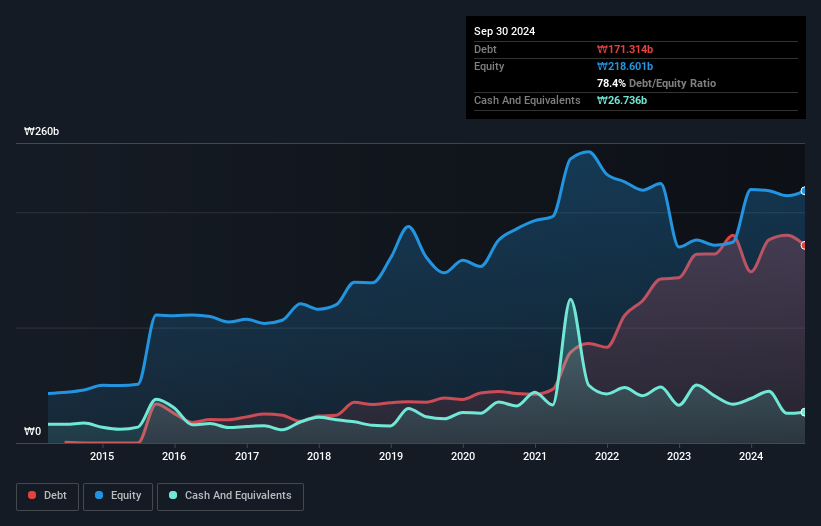
The external fund manager backed by Berkshire Hathaway's Charlie Munger, Li Lu, makes no bones about it when he says 'The biggest investment risk is not the volatility of prices, but whether you will suffer a permanent loss of capital.' So it might be obvious that you need to consider debt, when you think about how risky any given stock is, because too much debt can sink a company. As with many other companies Amicogen, Inc. (KOSDAQ:092040) makes use of debt. But is this debt a concern to shareholders?
When Is Debt A Problem?
Debt and other liabilities become risky for a business when it cannot easily fulfill those obligations, either with free cash flow or by raising capital at an attractive price. Part and parcel of capitalism is the process of 'creative destruction' where failed businesses are mercilessly liquidated by their bankers. While that is not too common, we often do see indebted companies permanently diluting shareholders because lenders force them to raise capital at a distressed price. By replacing dilution, though, debt can be an extremely good tool for businesses that need capital to invest in growth at high rates of return. When we think about a company's use of debt, we first look at cash and debt together.
See our latest analysis for Amicogen
How Much Debt Does Amicogen Carry?
The image below, which you can click on for greater detail, shows that Amicogen had debt of ₩171.3b at the end of September 2024, a reduction from ₩179.9b over a year. On the flip side, it has ₩26.7b in cash leading to net debt of about ₩144.6b.

How Strong Is Amicogen's Balance Sheet?
According to the last reported balance sheet, Amicogen had liabilities of ₩165.0b due within 12 months, and liabilities of ₩98.0b due beyond 12 months. Offsetting these obligations, it had cash of ₩26.7b as well as receivables valued at ₩56.7b due within 12 months. So it has liabilities totalling ₩179.5b more than its cash and near-term receivables, combined.
This deficit is considerable relative to its market capitalization of ₩231.1b, so it does suggest shareholders should keep an eye on Amicogen's use of debt. Should its lenders demand that it shore up the balance sheet, shareholders would likely face severe dilution. The balance sheet is clearly the area to focus on when you are analysing debt. But it is Amicogen's earnings that will influence how the balance sheet holds up in the future. So if you're keen to discover more about its earnings, it might be worth checking out this graph of its long term earnings trend.
In the last year Amicogen had a loss before interest and tax, and actually shrunk its revenue by 5.2%, to ₩156b. We would much prefer see growth.
Caveat Emptor
Over the last twelve months Amicogen produced an earnings before interest and tax (EBIT) loss. Indeed, it lost ₩7.4b at the EBIT level. Considering that alongside the liabilities mentioned above does not give us much confidence that company should be using so much debt. So we think its balance sheet is a little strained, though not beyond repair. However, it doesn't help that it burned through ₩64b of cash over the last year. So suffice it to say we consider the stock very risky. The balance sheet is clearly the area to focus on when you are analysing debt. But ultimately, every company can contain risks that exist outside of the balance sheet. Case in point: We've spotted 3 warning signs for Amicogen you should be aware of, and 2 of them are a bit unpleasant.
If you're interested in investing in businesses that can grow profits without the burden of debt, then check out this free list of growing businesses that have net cash on the balance sheet.
New: Manage All Your Stock Portfolios in One Place
We've created the ultimate portfolio companion for stock investors, and it's free.
• Connect an unlimited number of Portfolios and see your total in one currency
• Be alerted to new Warning Signs or Risks via email or mobile
• Track the Fair Value of your stocks
Have feedback on this article? Concerned about the content? Get in touch with us directly. Alternatively, email editorial-team (at) simplywallst.com.
This article by Simply Wall St is general in nature. We provide commentary based on historical data and analyst forecasts only using an unbiased methodology and our articles are not intended to be financial advice. It does not constitute a recommendation to buy or sell any stock, and does not take account of your objectives, or your financial situation. We aim to bring you long-term focused analysis driven by fundamental data. Note that our analysis may not factor in the latest price-sensitive company announcements or qualitative material. Simply Wall St has no position in any stocks mentioned.
About KOSDAQ:A092040
Amicogen
Operates as an industrial biotechnology company in South Korea and internationally.
Low and slightly overvalued.
Market Insights
Community Narratives





